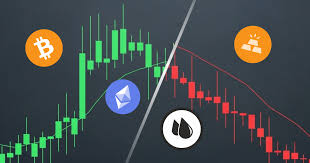The Future of Finance Understanding Crypto Trading Exchange

Understanding Crypto Trading Exchanges
The world of finance is evolving rapidly, driven by the advent of digital currencies and blockchain technology. Among the most significant developments in this landscape is the rise of crypto trading exchanges. These platforms serve as the backbone for cryptocurrency transactions, enabling users to buy, sell, and trade various digital assets. In this article, we will delve into the functionality, significance, and future prospects of crypto trading exchanges. To gain a more comprehensive understanding, crypto trading exchange click here for more insights.
What is a Crypto Trading Exchange?
A crypto trading exchange is a digital marketplace that facilitates the buying and selling of cryptocurrencies. These platforms allow users to convert traditional fiat currencies, such as the US dollar or euro, into various cryptocurrencies like Bitcoin, Ethereum, and many others. Crypto exchanges can be categorized into two main types: centralized and decentralized exchanges.
Centralized Exchanges
Centralized exchanges (CEX) are platforms that are operated by centralized entities. Users must create accounts and deposit their funds into the exchange, which acts as a custodian. CEXs are known for their user-friendly interfaces and high liquidity, making them ideal for newcomers to the crypto space. However, they also come with risks, such as potential hacks and regulatory scrutiny.
Decentralized Exchanges
On the other hand, decentralized exchanges (DEX) operate without a central authority. They allow users to trade cryptocurrencies directly with one another using smart contracts and blockchain technology. DEXs provide increased privacy and security as users retain control over their private keys. However, they may have lower liquidity and can be more complex for beginners.
How Do Crypto Trading Exchanges Work?

Crypto trading exchanges function by using order books to match buy and sell orders. When a trader wants to purchase a cryptocurrency, they place a buy order with a specified price. If there is a corresponding sell order at that price, the exchange matches the requests and executes the trade. Most exchanges offer various trading options such as market orders, limit orders, and stop-loss orders to accommodate different trading strategies.
Key Features of Crypto Trading Exchanges
Here are some essential features commonly found in crypto trading exchanges:
1. Security Measures
Security is paramount in the crypto space, and reputable exchanges implement several measures, including two-factor authentication (2FA), cold storage for funds, and regular security audits. Users should always ensure they choose platforms with strong security practices.
2. User Interface
A user-friendly interface is crucial for attracting both novice and experienced traders. Most exchanges offer intuitive dashboards that provide real-time price data, charts, and trading histories to facilitate informed decision-making.
3. Trading Fees
Trading fees are a critical aspect for many traders. Exchanges charge fees for executing trades, which can be a flat rate or a percentage of the transaction amount. It is advisable to compare fee structures across different exchanges to find one that aligns with your trading strategy.

4. Accessibility
The best crypto exchanges allow users to access their accounts via desktop and mobile applications. This accessibility enables traders to monitor the markets and execute trades on the go.
The Role of Liquidity in Exchanges
Liquidity refers to the ease with which an asset can be bought or sold in the market without affecting its price. High liquidity is desirable in trading exchanges, as it allows traders to execute orders quickly and at stable prices. Centralized exchanges generally offer higher liquidity due to the significant number of users and trading volumes. Conversely, DEXs may struggle with liquidity, especially for less popular trading pairs.
The Impact of Regulation on Crypto Trading Exchanges
The regulatory landscape for cryptocurrencies and trading exchanges is continuously evolving. Governments worldwide are implementing regulations to protect consumers, prevent money laundering, and ensure financial stability. These regulations can impact how exchanges operate, their compliance requirements, and ultimately the user experience. Traders should stay informed about the regulatory environment in their jurisdiction, as it can significantly influence trading activities.
The Future of Crypto Trading Exchanges
As cryptocurrencies continue to gain mainstream acceptance, the future of crypto trading exchanges looks promising. Enhancements in technology, such as improved security protocols and advanced trading tools, will only bolster their appeal. Additionally, the rise of decentralized finance (DeFi) is spurring innovation in DEXs, as they become more user-friendly and feature-rich.
Conclusion
Crypto trading exchanges are pivotal to the growing ecosystem of digital currencies. By understanding the various types of exchanges, their functionalities, and key features, traders can make informed decisions about where to execute their trades. Whether opting for a centralized or decentralized platform, users must prioritize security and accessibility to enhance their trading experiences. As this sector continues to evolve, it will undoubtedly play a crucial role in shaping the future of finance.
